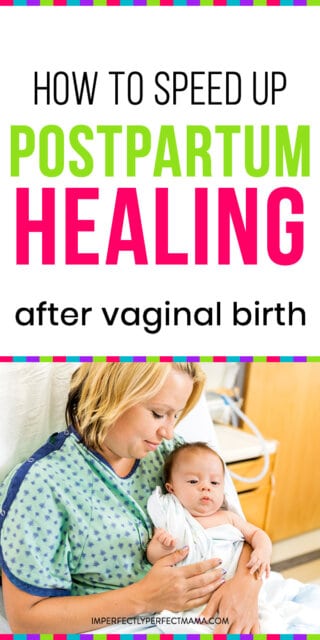Postpartum healing and recovery are just as important to prepare for as getting ready for birth and baby.

Ignoring this period of time is one of the biggest mistakes women make when it comes to childbirth.
Not only are you balancing your new role as a mom, navigating sleepless nights with a newborn, but you’re also recovering from some serious “down there” trauma.
It’s easy to misunderstand the fourth trimester, thinking the days after having a baby are simply filled with sparkles and newborn cuddles.
But the truth is, it can be really hard!
Whether you had an epidural or medication-free natural birth, vaginal healing and care are the same.
You know about the jumbo pads, perennial spray and witch hazel but there is more to healing postpartum after vaginal birth.
These tips will ensure you’re taking care of yourself, so you can better take care of your baby:
4 Secret Tips to Speed Postpartum Healing

1. Rest
Learning to balance life with a newborn is a unique challenge. You have to transition from being able to do what you want when you want to understanding that your new baby will never want to leave your side.
As women, we’re used to monopolizing every minute of the day to get as much done as possible. It can be easy to fall into this same rhythm after your baby is born.
You’ve heard the phrase “sleep when the baby sleeps.” Make sure you do it!
It can be tempting to do laundry, work, or cook if the baby is resting. Don’t do it unless it’s absolutely necessary and, if you can, enlist the help of your spouse, mom, in-laws or sister, to help out with these chores.
If the baby is sleeping, use that time to take care of yourself. Shower, get something nourishing to eat or sleep.
If you don’t have any family or friends who live nearby, look for ways to lessen your workload. You can order takeout so you don’t have to cook.
While you hold your sleeping baby, have groceries delivered to your door. Use paper and plastics to limit dishes.
Resting is the number one priority as a new mom, and it will do wonders for you physically and mentally.
Your body needs the rest to use its energy to heal faster. Your mind needs the rest to recharge, think clearly and navigate postpartum emotions.
Rest as much as you possibly can. Everything else can wait.
2. Limit Pain Medication
Leaving the hospital, it’s likely your doctor will write you a prescription for a stronger pain medicine than you can find over-the-counter. Fill the script and grab some lesser strength pain medication for your postpartum care basket, but use them sparingly.
Taking pain medication will surely make you feel a lot better, but that’s because it’s masking your real symptoms. When you take something that hides how you really feel, you’ll start to perform normally.
You may forget that you’re recovering and that your vagina and uterus just endured trauma. This will not only make healing last longer, but you’ll worsen your recovery because you’ll add to it!
For example: carrying a load of laundry to wash hurts to bend down and the weight of the laundry is too much. It feels totally fine with medicine, but you don’t realize you’re pushing yourself too much. This will cause you more harm and extend postpartum healing longer than it should.
Certainly, don’t be in serious pain, and if you are be sure to call your health care provider.
Instead, use pain medication sparingly. Your body is sore and hurting because it wants you to know to take it easy.
You’ll know if moving a certain way or doing a specific task feels okay or not to do by limited pain medicine.
3. Vitamins
You know the importance of taking your prenatal vitamin, but did you know that it’s recommended to take a pre or postnatal vitamin for up to at least six months postpartum?
Pregnancy is really hard on your body. It’s a natural and beautiful miracle, but it’s also depleting.
Remember during the first and last trimester when you were so exhausted and napped all day? Your body is tired because it’s working overtime to create a healthy baby.
It takes a lot of energy and resources. Resources that your body steals from you for baby.
As people, we store energy, fat, and vitamins to use in the event we get sick or aren’t able to eat or drink for a long period of time. It’s a survival skill that was developed when we were hunters and gathers, not knowing when our next meal would be.
These reserves also come in handy during pregnancy. When you’re nauseous during the first trimester and not eating, or you really just don’t like eating spinach and greens, your body relies on those reserves to nourish the baby.
Your baby solely relies on you and your body to get the nutrition she needs to develop. If she is lacking water or vitamins, for example, she has no other option but to take them from your body and your reserves.
So by the time you give birth, you’re pretty depleted of a lot of that storage. Couple that with the fact that you just gave birth and are healing, and you are one weak and tired mama.
It’s not always possible to eat a balanced diet to satisfy all of your nutritional needs. It’s really hard to do this normally, let alone after just giving birth and taking care of a newborn.
Continuing to take your prenatal vitamin is an excellent way to make sure that your body has everything it needs to heal and get back to normal.
This is especially important if your breastfeeding. Now that you’re healing from birth, refueling your body after 10 months of pregnancy and creating food to feed another person.
Get yourself in a good spot by eating a balanced diet filled with good fats and carbohydrates, drinking as much water as you possibly can and taking a pre or postnatal vitamin.
4. Nutrition
Obviously, you can’t get everything your body needs to heal and recover with just a vitamin. The vitamin is aimed to fill in the gaps that your diet doesn’t cover.
However, you need to make sure you are nutritionally taking care of yourself. Now is not the time to eat only vegetables and fruit or cut calories to lost baby fat. Your body needs a healthy balance of carbohydrates, vegetables, fruit and fat.
Your body will burn through calories and food as it uses its energy to heal and make milk. You will immediately notice if your diet needs tweaked because your milk supply won’t be abundant and you’ll be extremely fatigued.
You will be tired anyway and need milk for your baby, so don’t jeopardize those even more with a poor diet.
Get ahead of this by meal prepping freezer meals in your third trimester. There are a ton of well-balanced meals you can prep now for later. Cooking and meal prepping ahead of time is key for two reasons.
Preparing meals with a newborn is tough! You’re feeding and holding your baby all of the time. You don’t have the ability to go to the store, prep food or stand by a hot stove.
Secondly, it will save you from living off of easy-to-grab food like chips and cereal while you’re taking care of your baby.
If you’ve already had your baby, congrats! Take advantage of takeout food options. Some restaurants will even make catering quantities you can easily reheat.
You can also reach out to friends and family. Let them cook or get groceries for you!
The important thing is that you’re eating well-balanced meals so that you can heal faster. It will also help with your overall well-being and your milk supply.
Eating chips and cookies are fun and fine, but be sure to get some greens, carbohydrates and good fats in there too!
Conclusion
Give yourself a pat on the back. You’ve given birth and that makes you superwoman. Your baby’s sole provider and that’s a big responsibility.
Taking care of your baby the best way possible means taking care of yourself.
During your fourth trimester, speed healing postpartum by getting plenty of rest, eating a well-balanced diet, continuing your prenatal vitamin and limiting pain medication.
Remember that this time is short. It will have its challenges, but it will also be beautiful.
Enjoy and take care, mama.




Leave a Reply